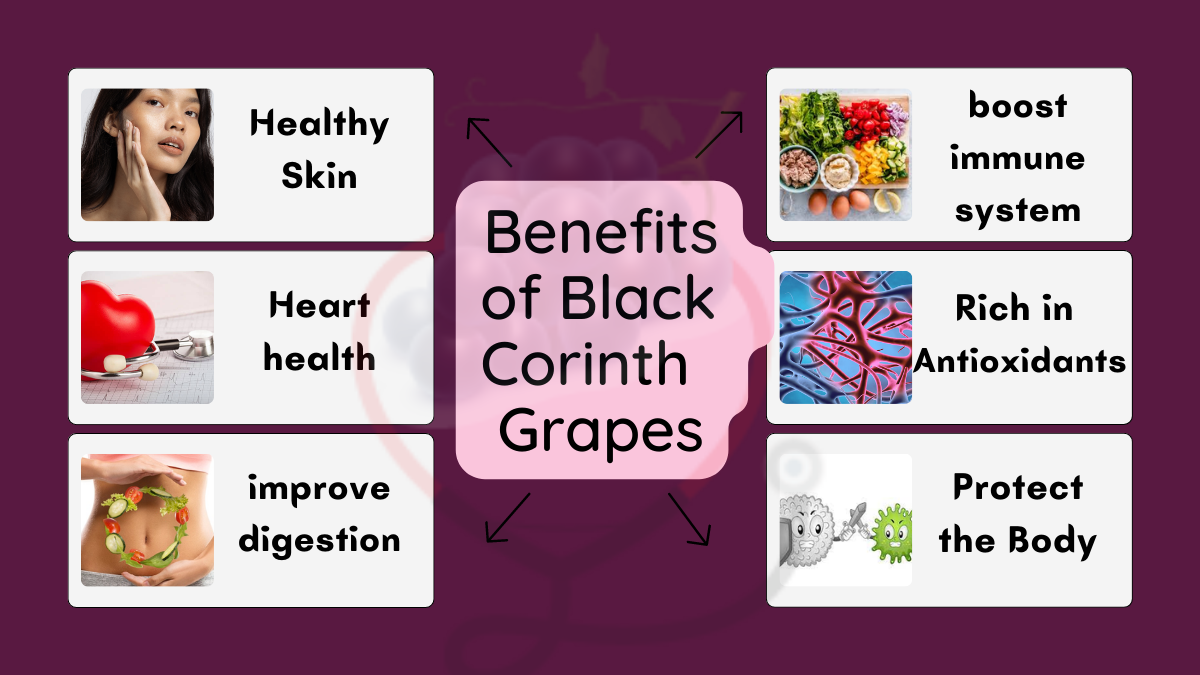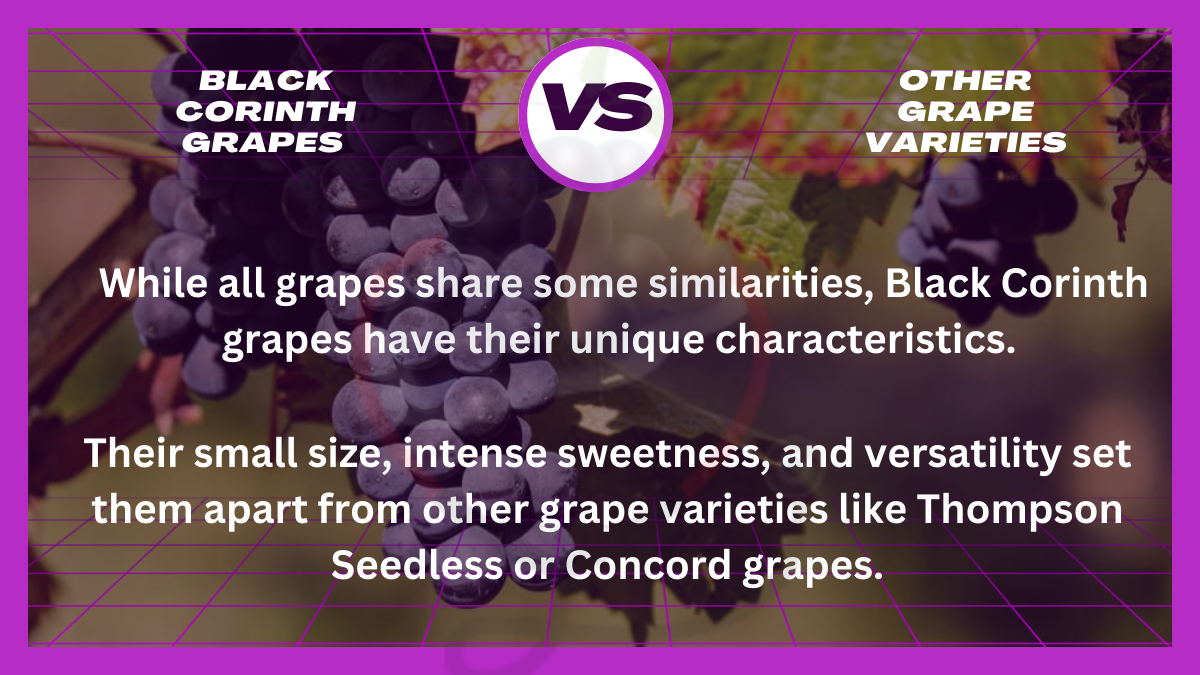Black Corinth grapes, also known as Zante currants or simply currants, are small, dark-colored grapes with a rich history dating back thousands of years.
Black Corinth grapes, scientifically known as Vitis vinifera, are a variety of seedless grapes that grow on deciduous woody vines. [1]
They are small and round, with a deep purple to black color when fully ripe.

These grapes are naturally sweet and have a distinctive flavor that sets them apart from other grape varieties.
These tiny fruits may be small in size, but they pack a powerful nutritional punch.
In this article, we’ll explore the fascinating world of Black Corinth grapes, from their origins and health benefits to their culinary uses and growing tips.
Origin of Black Corinth Grapes
The history of Black Corinth grapes dates back to ancient times, where they were first cultivated in the region of Corinth in Greece.
The ancient Greeks and Romans highly prized these grapes for their sweetness and versatility.
Over the centuries, Black Corinth grapes became popular commodities in trade and were introduced to various parts of the world, including Asia and Europe.
Nutritional Value of Black Corinth Grapes

- Despite their size, Black Corinth grapes are rich in essential nutrients. [2]
- They are a great source of vitamins and minerals, including vitamin C, vitamin K, potassium, and iron.
- They contain natural sugars and dietary fiber, making them a healthy and delicious snack option.
Health Benefits of Black Corinth Grapes

1: Rich in Antioxidants
Black Corinth grapes are packed with antioxidants, such as resveratrol and quercetin. [3]
These powerful compounds help combat oxidative stress in the body, reducing the risk of chronic diseases and supporting overall well-being.
2: Good for Heart Health
The antioxidants present in Black Corinth grapes also contribute to heart health. [4]
They can help lower blood pressure, reduce cholesterol levels, and improve blood circulation, thereby promoting a healthy heart.
3: May Aid in Digestion
The dietary fiber found in Black Corinth grapes aids in digestion and may help prevent digestive issues such as constipation. [5]
They contain natural sugars, which can provide a quick energy boost.
4: Supports Healthy Skin
The vitamins and antioxidants in Black Corinth grapes contribute to radiant and healthy skin. [6]
They help protect the skin from damage caused by free radicals and promote collagen production for a youthful appearance.
5: Boosts Immunity
The high vitamin C content in Black Corinth grapes strengthens the immune system, helping the body fight off infections and illnesses. [7]
Culinary Uses of Black Corinth Grapes
Black Corinth grapes are incredibly versatile in the kitchen and can be used in various culinary applications.

1: Raisins
One of the most common uses of Black Corinth grapes is to make raisins.
These dried grapes are popular additions to cereals, baked goods, and desserts.
2: Wine Production
Due to their high sugar content, Black Corinth grapes are ideal for wine production.
They are a key ingredient in the famous sweet dessert wine, “Muscat.”
3: Desserts and Baked Goods
Fresh Black Corinth grapes can be incorporated into a wide array of desserts and baked goods, such as tarts, cakes, and fruit salads.
How to Grow Black Corinth Grapes
If you’re interested in growing your own Black Corinth grapes, here are some essential tips to get you started.

1: Choosing the Right Location
Select a sunny spot with well-draining soil for planting the grapevines.
Adequate sunlight is crucial for proper fruit development.
2: Planting Process
Plant Black Corinth grapevines in early spring or fall.
Ensure they have adequate support, such as trellises or arbors, as they grow.
3: Pruning and Maintenance
Regular pruning is necessary to keep the vines healthy and to encourage fruit production.
Proper maintenance will ensure a bountiful harvest.
Black Corinth Grapes vs. Other Grape Varieties
While all grapes share some similarities, Black Corinth grapes have their unique characteristics.

Their small size, intense sweetness, and versatility set them apart from other grape varieties like Thompson Seedless or Concord grapes.
Black Corinth grapes are a small fruit with significant health benefits and culinary versatility.
From their ancient origins to their use in wine production and desserts, these tiny grapes have captured the admiration of many throughout history.
Whether you enjoy them fresh, as raisins, or in a glass of Muscat wine, Black Corinth grapes are a delicious addition to any diet.
So, why not indulge in the goodness of these tiny yet mighty fruits and savor their unique flavors and benefits!
Frequently Asked Questions (FAQs)
Are Black Corinth grapes seedless?
Yes, Black Corinth grapes are seedless, making them a convenient and enjoyable snack.
Can Black Corinth grapes be used in savory dishes?
While they are commonly used in sweet dishes, some recipes incorporate Black Corinth grapes in savory salads and sauces.
Do Black Corinth grapes have any side effects?
Black Corinth grapes are generally safe to consume. However, some individuals may be allergic to grapes and should avoid them.
Are Black Corinth grapes suitable for diabetics?
As with all sweet fruits, Black Corinth grapes should be consumed in moderation by individuals with diabetes. Consult a healthcare professional for personalized advice.
Can I grow Black Corinth grapes indoors?
While it is possible to grow Black Corinth grapes in containers indoors, they thrive best when planted outdoors with ample sunlight.

